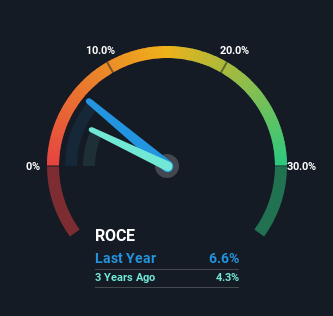Dhampur Bio Organics (NSE:DBOL) Is Looking To Continue Growing Its Returns On Capital
If we want to find a stock that could multiply over the long term, what are the underlying trends we should look for? Ideally, a business will show two trends; firstly a growing return on capital employed (ROCE) and secondly, an increasing amount of capital employed. Put simply, these types of businesses are compounding machines, meaning they are continually reinvesting their earnings at ever-higher rates of return. With that in mind, we've noticed some promising trends at Dhampur Bio Organics (NSE:DBOL) so let's look a bit deeper.
Return On Capital Employed (ROCE): What Is It?
For those that aren't sure what ROCE is, it measures the amount of pre-tax profits a company can generate from the capital employed in its business. The formula for this calculation on Dhampur Bio Organics is:
Return on Capital Employed = Earnings Before Interest and Tax (EBIT) ÷ (Total Assets - Current Liabilities)
0.066 = ₹834m ÷ (₹23b - ₹11b) (Based on the trailing twelve months to June 2024).
Therefore, Dhampur Bio Organics has an ROCE of 6.6%. In absolute terms, that's a low return and it also under-performs the Food industry average of 13%.
View our latest analysis for Dhampur Bio Organics

Historical performance is a great place to start when researching a stock so above you can see the gauge for Dhampur Bio Organics' ROCE against it's prior returns. If you'd like to look at how Dhampur Bio Organics has performed in the past in other metrics, you can view this free graph of Dhampur Bio Organics' past earnings, revenue and cash flow.
The Trend Of ROCE
Even though ROCE is still low in absolute terms, it's good to see it's heading in the right direction. The data shows that returns on capital have increased substantially over the last three years to 6.6%. Basically the business is earning more per dollar of capital invested and in addition to that, 35% more capital is being employed now too. This can indicate that there's plenty of opportunities to invest capital internally and at ever higher rates, a combination that's common among multi-baggers.
On a side note, Dhampur Bio Organics' current liabilities are still rather high at 45% of total assets. This can bring about some risks because the company is basically operating with a rather large reliance on its suppliers or other sorts of short-term creditors. Ideally we'd like to see this reduce as that would mean fewer obligations bearing risks.
Our Take On Dhampur Bio Organics' ROCE
In summary, it's great to see that Dhampur Bio Organics can compound returns by consistently reinvesting capital at increasing rates of return, because these are some of the key ingredients of those highly sought after multi-baggers. Given the stock has declined 15% in the last year, this could be a good investment if the valuation and other metrics are also appealing. That being the case, research into the company's current valuation metrics and future prospects seems fitting.
Dhampur Bio Organics does come with some risks though, we found 4 warning signs in our investment analysis, and 1 of those shouldn't be ignored...
For those who like to invest in solid companies, check out this free list of companies with solid balance sheets and high returns on equity.
New: Manage All Your Stock Portfolios in One Place
We've created the ultimate portfolio companion for stock investors, and it's free.
• Connect an unlimited number of Portfolios and see your total in one currency
• Be alerted to new Warning Signs or Risks via email or mobile
• Track the Fair Value of your stocks
Have feedback on this article? Concerned about the content? Get in touch with us directly. Alternatively, email editorial-team (at) simplywallst.com.
This article by Simply Wall St is general in nature. We provide commentary based on historical data and analyst forecasts only using an unbiased methodology and our articles are not intended to be financial advice. It does not constitute a recommendation to buy or sell any stock, and does not take account of your objectives, or your financial situation. We aim to bring you long-term focused analysis driven by fundamental data. Note that our analysis may not factor in the latest price-sensitive company announcements or qualitative material. Simply Wall St has no position in any stocks mentioned.
About NSEI:DBOL
Dhampur Bio Organics
An integrated sugarcane processing company, engages in the manufacture and sale of refined, sulphitation, raw sugar, sugar, biomass-based renewable power, biofuels, potable liquor, chemicals, and allied products in India.
Slight risk second-rate dividend payer.
Market Insights
Community Narratives



